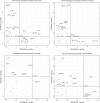Biomarkers Predictive of Exacerbations in the SPIROMICS and COPDGene Cohorts
- PMID: 27579823
- PMCID: PMC5378424
- DOI: 10.1164/rccm.201607-1330OC
Biomarkers Predictive of Exacerbations in the SPIROMICS and COPDGene Cohorts
Abstract
Rationale: Chronic obstructive pulmonary disease exacerbations are associated with disease progression, higher healthcare cost, and increased mortality. Published predictors of future exacerbations include previous exacerbation, airflow obstruction, poor overall health, home oxygen use, and gastroesophageal reflux.
Objectives: To determine the value of adding blood biomarkers to clinical variables to predict exacerbations.
Methods: Subjects from the SPIROMICS (Subpopulations and Intermediate Outcomes Measures in COPD Study) (n = 1,544) and COPDGene (Genetic Epidemiology of COPD) (n = 602) cohorts had 90 plasma or serum candidate proteins measured on study entry using Myriad-RBM multiplex panels. We defined total exacerbations as subject-reported worsening in respiratory health requiring therapy with corticosteroids and/or antibiotics, and severe exacerbations as those leading to hospitalizations or emergency room visits. We assessed retrospective exacerbations during the 12 months before enrollment and then documented prospective exacerbations in each cohort. Exacerbations were modeled for biomarker associations with negative binomial regression including clinical covariates (age, sex, percent predicted FEV1, self-reported gastroesophageal reflux, St. George's Respiratory Questionnaire score, smoking status). We used the Stouffer-Liptak test to combine P values for metaanalysis.
Measurements and main results: Between the two cohorts, 3,471 total exacerbations (1,044 severe) were reported. We identified biomarkers within each cohort that were significantly associated with a history of exacerbation and with a future exacerbation, but there was minimal replication between the cohorts. Although established clinical features were predictive of exacerbations, of the blood biomarkers only decorin and α2-macroglobulin increased predictive value for future severe exacerbations.
Conclusions: Blood biomarkers were significantly associated with the occurrence of exacerbations but were not robust between cohorts and added little to the predictive value of clinical covariates for exacerbations.
Keywords: COPD; biomarker; exacerbation.
Figures

Comment in
-
Prediction of Chronic Obstructive Pulmonary Disease Exacerbation Frequency. Clinical Parameters Are Still Better Than Biomarkers.Am J Respir Crit Care Med. 2017 Feb 15;195(4):415-416. doi: 10.1164/rccm.201610-2037ED. Am J Respir Crit Care Med. 2017. PMID: 28199159 No abstract available.
References
-
- Hurst JR, Vestbo J, Anzueto A, Locantore N, Müllerova H, Tal-Singer R, Miller B, Lomas DA, Agusti A, Macnee W, et al. Evaluation of COPD Longitudinally to Identify Predictive Surrogate Endpoints (ECLIPSE) Investigators. Susceptibility to exacerbation in chronic obstructive pulmonary disease. N Engl J Med. 2010;363:1128–1138. - PubMed
-
- Agustí A, Faner R. Systemic inflammation and comorbidities in chronic obstructive pulmonary disease. Proc Am Thorac Soc. 2012;9:43–46. - PubMed
Publication types
MeSH terms
Substances
Grants and funding
- R01 HL130883/HL/NHLBI NIH HHS/United States
- HHSN268200900009C/WH/WHI NIH HHS/United States
- S10 OD018526/OD/NIH HHS/United States
- U01 HL089897/HL/NHLBI NIH HHS/United States
- R01 HL095432/HL/NHLBI NIH HHS/United States
- R01 HL089856/HL/NHLBI NIH HHS/United States
- R01 HL126838/HL/NHLBI NIH HHS/United States
- HHSN268200900016C/HL/NHLBI NIH HHS/United States
- I01 CX000911/CX/CSRD VA/United States
- U01 HL137880/HL/NHLBI NIH HHS/United States
- HHSN268200900018C/HL/NHLBI NIH HHS/United States
- HHSN268200900013C/HL/NHLBI NIH HHS/United States
- HHSN268200900014C/HL/NHLBI NIH HHS/United States
- U54 MD008149/MD/NIMHD NIH HHS/United States
- R01 HL089897/HL/NHLBI NIH HHS/United States
- HHSN268200900019C/HL/NHLBI NIH HHS/United States
- U01 HL089856/HL/NHLBI NIH HHS/United States
- HHSN268200900015C/HL/NHLBI NIH HHS/United States
- HHSN268200900017C/HL/NHLBI NIH HHS/United States
- HHSN268200900020C/HL/NHLBI NIH HHS/United States
LinkOut - more resources
Full Text Sources
Other Literature Sources
Medical
Molecular Biology Databases

